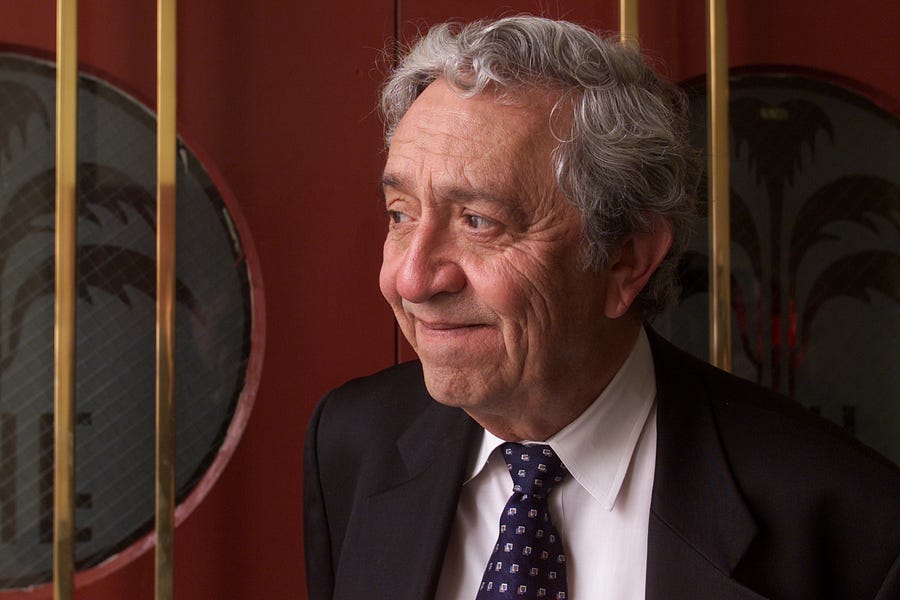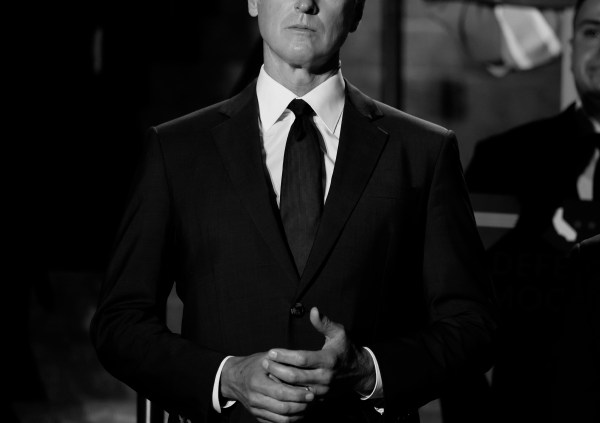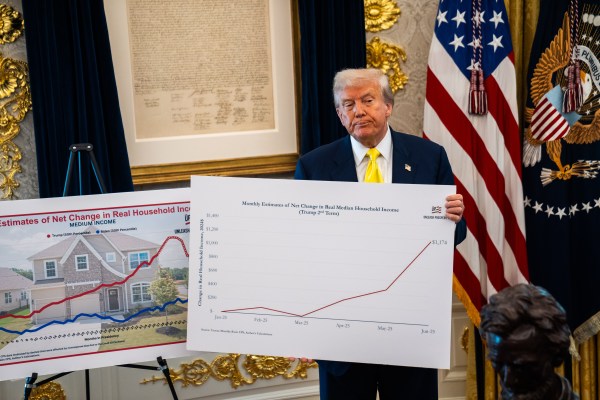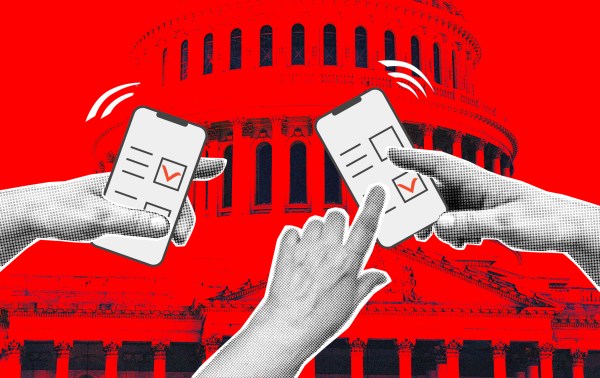Bruce Herschensohn, who died in Los Angeles on Monday at the age of 88, was a fixture of California conservatism for decades before he ran for Senate in 1992 against Barbara Boxer. A man of high ideals, he found the demands of campaigning—especially asking for money—difficult to stomach. And running during what the media dubbed “The Year of the Woman” was virtually quixotic. His resolute belief in limited government didn’t help, either. He supported the flat tax, school choice, and the privatization of Social Security, all of which helped Boxer’s campaign portray him as a radical extremist.
Radical, maybe. Dangerous, certainly not. Bruce’s outstanding quality was his calm, kind demeanor and a sincerity that penetrated any listener’s emotional shields and engaged at the level of rational argument. His ideas were not only well reasoned, but delivered in so persuasively amiable a way that even his long-time debating partners, such as Democrats John Tunney and Bill Press, became good friends.
Born in Milwaukee in 1932, Bruce entered public life through film: After serving in the Air Force, he founded a small movie company that made documentaries about the Kennedy Administration, the Space Race, and other subjects. In 1968, he won an Oscar for a film about the Prague Spring. That led to him being asked by Lyndon Johnson to head the United States Information Agency’s Motion Picture and Television Service, which aimed to persuade the world of the need for strong, American-led opposition to Soviet expansionism. Bruce was forced to resign that job in 1972 after speaking harshly against Democratic senator William Fulbright’s attacks on the Agency, but Richard Nixon promptly hired him as a personal aide. Bruce was 40 then, and as idealistic as a teenager. It was a quality he never lost.
He idolized Nixon, and fondly recounted stories of their relationship for the rest of his life. “If you had your choice during those days of taking a round-the-world trip for six months,” he told a conference at the Nixon Library two years ago, “or [spending] six hours with President Nixon, I would choose the six hours with President Nixon, because you would learn a lot more.” On one occasion, he claimed, he and Nixon had tried counting how many foreign nations they had visited. Bruce ended up one ahead. A month later, Nixon visited China and broke even.
Herschensohn’s admiration for Nixon, as well as for Kennedy and for Reagan (on whose transition team he served in 1980), was rooted in his intense love of freedom and of foreign policy. Particularly dear to him were Hong Kong and Taiwan, as reflected in such books as Hong Kong at the Handover and Taiwan: The Threatened Democracy. Friends with countless pro-freedom activists in Asia, he visited Hong Kong every year until 2020, and insisted to anyone who would listen that China had no lawful right to the tiny island, which China ceded “in perpetuity” to Britain in treaties in 1842 and 1860. Its so-called return to the People’s Republic was not a “return” at all, he insisted, but a shameful surrender of one of the world’s freest societies. As for Taiwan, he was emphatic that its people should “have the courage to reject anything short of living in liberty as a free and independent nation.” He was horrified, in the final days of his life, to learn that many pro-democracy activists with whom he was personal friends were being arrested by officers of the PRC.
Emphatic as he was that freedom should yield nothing to communism, his proposals for defending international liberty were often unorthodox and clever. Regarding the United Nations as a pathetic farce—in part because of its 1971 betrayal of Taiwan—he recommended not closing it, but simply starting a competing organization to be called the Nations of Liberty Alliance, with membership limited only to democracies. And he insisted that America should always be a refuge for the world’s oppressed. “Border control does not mean the building of a wall, and we should never have one,” he wrote. “Our system of immigration should be based, first, on the degree of persecution from the country of origin. … The person we classify as a legitimate refugee for legal residence in the United States should be one who seeks liberty, escaping from a government that is in opposition to the United States.”
Much as he loved international politics, Bruce was even brighter on domestic issues. His 1994 book Lost Trumpets bristles with policy proposals that have lost none of their ingenuity or applicability in the ensuing decades. He proposed amending the Constitution to ban Congress from exempting itself from laws; making the vice president serve as White House chief of staff to prevent inter-staff rivalry and ensure that the successor is fully briefed if he needs to take over; and giving the president line-item veto power—but only if he first submits a balanced budget to Congress. Bruce called for selling federally owned land to pay off the national debt; abolishing the capital gains tax, estate taxes, and taxes on dividends; and including sunset provisions in all regulations so that every government agency would “physically go out of business … unless they can justify their existence in terms of economic impact and in terms of non-violation of constitutional rights.” It made no sense, he said, that the federal government controlled local matters and funded them through taxes taken out of those states to begin with. “Why should it be that we think we take a dollar, and send it to Washington, D.C., twenty-seven hundred miles away, and [expect] that they are going to decide best how we should spend it in Sacramento? Or city hall? Or the school district?”
After Nixon’s resignation, Herschensohn returned to California, where he worked as a political commentator for KABC, presenting daily editorials on its radio and television broadcasts for more than 15 years. In these—and during his Senate campaigns in 1986 and 1992—he was unafraid to challenge old assumptions and stubborn in his refusal to employ euphemisms and misleading slogans. “The one thing I want to have, above all, is a clear conscience that I haven’t conned anybody when I get to Washington,” he said. But his plain talk also reflected an inborn love of teaching. Even while debating Boxer on the campaign trail, he couldn’t help trying to explain to voters why they should care about the deficit. “I want you to recognize that the deficit or the debt is nothing more than a delayed taxation with a great deal of interest,” he said.
We have now got the next generation into debt—four trillion dollars. I don’t see a conscience in this country, and I think we all ought to have a very heavy conscience. … Those kids are going to be born. We’re all going to be gone. And they’re going to say “My god, what did they do to us?” … That’s worse than being a common thief. A common thief, you can hope gets prosecuted; you can hope you get some of the material back. They’re not going to get any of it back. It is a dirty trick that we have done for services for this generation. So whenever you hear a service that you want … please realize that what we are doing, and this is so important, is buying services for us while we’re alive, and charging it to those people who aren’t born yet.
Bruce’s principled positions, unorthodox thinking, and blunt but gentlemanly manner were already going out of fashion in an age of sound-bite politics, and it’s little surprise that he lost to Boxer. Yet he came remarkably close to success, garnering a million more votes than President George H.W. Bush, who was running for reelection. In fact, Herschensohn’s narrow defeat was attributed by many to a last-minute leak by the Boxer campaign which circulated the story that he had gone to a strip club (with his girlfriend!)—which, at a time when Republicans were promoting “family values,” was enough to cost him votes.
After the election, Herschensohn joined the Claremont Institute, then taught at Harvard and Pepperdine. In these roles, he gathered numerous protégés (including Congressman Sonny Bono, with whom he was particularly close) and published eleven books, including four novels. Not bad for someone who never attended college.
Gentlemanly, kind, sincere, Bruce Herschensohn carried a quiet but unmistakable passion for freedom and the country he believed to be its natural home. “The world deserves at least one nation,” he said, “that pursues the fulfillment of the dreams of liberty.” His life was a monument to a style of politics that now seems to have vanished, and may be more needed today than ever.
Timothy Sandefur is Vice President for Litigation at the Goldwater Institute and author, most recently, of The Ascent of Jacob Bronowski: The Life and Ideas of a Popular Science Icon (Prometheus Books, 2018).
Photo by Bob Carey/Los Angeles Times via Getty Images.






Please note that we at The Dispatch hold ourselves, our work, and our commenters to a higher standard than other places on the internet. We welcome comments that foster genuine debate or discussion—including comments critical of us or our work—but responses that include ad hominem attacks on fellow Dispatch members or are intended to stoke fear and anger may be moderated.
With your membership, you only have the ability to comment on The Morning Dispatch articles. Consider upgrading to join the conversation everywhere.